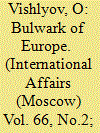|
|
|
Sort Order |
|
|
|
Items / Page
|
|
|
|
|
|
|
| Srl | Item |
| 1 |
ID:
192444


|
|
|
|
|
| Summary/Abstract |
THE demands formulated by the Soviet government at talks with Great Britain and France on May 14, 1939, are still controversial. On that day, Moscow invited London and Paris to guarantee the neutrality and sovereignty of three Baltic republics (Latvia, Estonia, and Finland) that bordered the Soviet Union in case of German aggression.1 This issue roused acute disagreements at trilateral political negotiations that lasted until early August 1939. The draft trilateral agreement did contain the provision of trilateral guarantees against direct aggression, yet the issue of opposition to indirect aggression was excluded from the final text on account of Britain's position. The political agreement was never signed, while on August 12, the military missions of the three countries opened discussions of possible interaction in case of German aggression.
|
|
|
|
|
|
|
|
|
|
|
|
|
|
|
|
| 2 |
ID:
171269


|
|
|
|
|
| Summary/Abstract |
NO BALANCE in Eastern Europe and, therefore, in entire Europe is possible as long as the Muscovite Empire exists. No new order in possible in an unbalanced Europe. ... "Therefore, the Muscovite Empire should be liquidated... ... "Its liquidation, indispensable for the calm and order in Europe, is fairly easy to realize since the Ukrainian people have already covered a considerable part of the road by its staunch and sacrificial struggle against Moscow.
|
|
|
|
|
|
|
|
|
|
|
|
|
|
|
|
| 3 |
ID:
167764


|
|
|
|
|
| Summary/Abstract |
WORLD WAR I changed the political map of Central and Eastern Europe. In 1918-1919, the breakup of the regionally dominant Austro-Hungarian and Russian empires and a significant weakening of Germany led to the emergence of eight new states in the region: Austria, Hungary, Czechoslovakia, Poland, Lithuania, Latvia, Estonia, and Finland. For the five countries of Southeastern Europe that gained independence in the 19th century (Greece, Bulgaria, Albania, Romania, and Serbia) with the disintegration of another great power, the Ottoman Empire, which had lost many territories and emerged as the Republic of Turkey, the conditions of existence changed significantly. Serbia became the core of a new state, the Kingdom of Serbs, Croats, and Slovenes, renamed Yugoslavia in 1929.
|
|
|
|
|
|
|
|
|
|
|
|
|
|
|
|
| 4 |
ID:
182920


|
|
|
|
|
| Summary/Abstract |
ON DECEMBER 18, 1940, Hitler signed his directive on preparations for attacking the Soviet Union (Operation Barbarossa). The High Command of the German Armed Forces (OKW) subsequently began planning disinformation measures to conceal Germany's military preparations at the Soviet border. The plan was approved on February 15, 1941, but was subsequently revised and elaborated. That disinformation operation has already been described in detail.1...
|
|
|
|
|
|
|
|
|
|
|
|
|
|
|
|
| 5 |
ID:
180772


|
|
|
|
|
| Summary/Abstract |
ON THE evening of June 21, 1941, just hours before the German invasion of the Soviet Union, Marshal Semyon Timoshenko, people's commissar for defense, and General of the Army Georgy Zhukov, chief of the Red Army General Staff, were at the Kremlin, urging Joseph Stalin in the wake of new reports of German military activity along the western border of the USSR to immediately issue a directive to activate the Soviet Union's previously approved plan of response to a potential German attack. But the Soviet leader was dragging his heels. He was waiting for news from the People's Commissariat for Foreign Affairs.
|
|
|
|
|
|
|
|
|
|
|
|
|
|
|
|
|
|
|
|
|